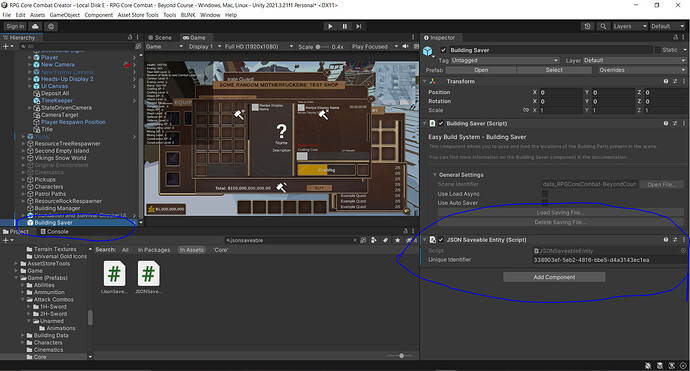OK so… after a little bit of thinking, I figured the ‘BuildingSaver.cs’ was not going to work, as it saves independent of the scene. So what I did instead, and that’s what we’ve been doing the entire way, but I didn’t notice it well, was add the JSONSaveableEntity.cs script on a building part, and inject the IJsonSaveable Interface into ‘BuildingPart.cs’. However, I saw an error that I have never seen before in my life, and it’s quite a lengthy one:
JsonSerializationException: Self referencing loop detected for property 'normalized' with type 'UnityEngine.Vector3'. Path 'Position.normalized'.
Newtonsoft.Json.Serialization.JsonSerializerInternalWriter.CheckForCircularReference (Newtonsoft.Json.JsonWriter writer, System.Object value, Newtonsoft.Json.Serialization.JsonProperty property, Newtonsoft.Json.Serialization.JsonContract contract, Newtonsoft.Json.Serialization.JsonContainerContract containerContract, Newtonsoft.Json.Serialization.JsonProperty containerProperty) (at <761cf2a144514d2291a678c334d49e9b>:0)
Newtonsoft.Json.Serialization.JsonSerializerInternalWriter.CalculatePropertyValues (Newtonsoft.Json.JsonWriter writer, System.Object value, Newtonsoft.Json.Serialization.JsonContainerContract contract, Newtonsoft.Json.Serialization.JsonProperty member, Newtonsoft.Json.Serialization.JsonProperty property, Newtonsoft.Json.Serialization.JsonContract& memberContract, System.Object& memberValue) (at <761cf2a144514d2291a678c334d49e9b>:0)
Newtonsoft.Json.Serialization.JsonSerializerInternalWriter.SerializeObject (Newtonsoft.Json.JsonWriter writer, System.Object value, Newtonsoft.Json.Serialization.JsonObjectContract contract, Newtonsoft.Json.Serialization.JsonProperty member, Newtonsoft.Json.Serialization.JsonContainerContract collectionContract, Newtonsoft.Json.Serialization.JsonProperty containerProperty) (at <761cf2a144514d2291a678c334d49e9b>:0)
Newtonsoft.Json.Serialization.JsonSerializerInternalWriter.SerializeValue (Newtonsoft.Json.JsonWriter writer, System.Object value, Newtonsoft.Json.Serialization.JsonContract valueContract, Newtonsoft.Json.Serialization.JsonProperty member, Newtonsoft.Json.Serialization.JsonContainerContract containerContract, Newtonsoft.Json.Serialization.JsonProperty containerProperty) (at <761cf2a144514d2291a678c334d49e9b>:0)
Newtonsoft.Json.Serialization.JsonSerializerInternalWriter.SerializeObject (Newtonsoft.Json.JsonWriter writer, System.Object value, Newtonsoft.Json.Serialization.JsonObjectContract contract, Newtonsoft.Json.Serialization.JsonProperty member, Newtonsoft.Json.Serialization.JsonContainerContract collectionContract, Newtonsoft.Json.Serialization.JsonProperty containerProperty) (at <761cf2a144514d2291a678c334d49e9b>:0)
Newtonsoft.Json.Serialization.JsonSerializerInternalWriter.SerializeValue (Newtonsoft.Json.JsonWriter writer, System.Object value, Newtonsoft.Json.Serialization.JsonContract valueContract, Newtonsoft.Json.Serialization.JsonProperty member, Newtonsoft.Json.Serialization.JsonContainerContract containerContract, Newtonsoft.Json.Serialization.JsonProperty containerProperty) (at <761cf2a144514d2291a678c334d49e9b>:0)
Newtonsoft.Json.Serialization.JsonSerializerInternalWriter.SerializeObject (Newtonsoft.Json.JsonWriter writer, System.Object value, Newtonsoft.Json.Serialization.JsonObjectContract contract, Newtonsoft.Json.Serialization.JsonProperty member, Newtonsoft.Json.Serialization.JsonContainerContract collectionContract, Newtonsoft.Json.Serialization.JsonProperty containerProperty) (at <761cf2a144514d2291a678c334d49e9b>:0)
Newtonsoft.Json.Serialization.JsonSerializerInternalWriter.SerializeValue (Newtonsoft.Json.JsonWriter writer, System.Object value, Newtonsoft.Json.Serialization.JsonContract valueContract, Newtonsoft.Json.Serialization.JsonProperty member, Newtonsoft.Json.Serialization.JsonContainerContract containerContract, Newtonsoft.Json.Serialization.JsonProperty containerProperty) (at <761cf2a144514d2291a678c334d49e9b>:0)
Newtonsoft.Json.Serialization.JsonSerializerInternalWriter.Serialize (Newtonsoft.Json.JsonWriter jsonWriter, System.Object value, System.Type objectType) (at <761cf2a144514d2291a678c334d49e9b>:0)
Newtonsoft.Json.JsonSerializer.SerializeInternal (Newtonsoft.Json.JsonWriter jsonWriter, System.Object value, System.Type objectType) (at <761cf2a144514d2291a678c334d49e9b>:0)
Newtonsoft.Json.JsonSerializer.Serialize (Newtonsoft.Json.JsonWriter jsonWriter, System.Object value) (at <761cf2a144514d2291a678c334d49e9b>:0)
Newtonsoft.Json.Linq.JToken.FromObjectInternal (System.Object o, Newtonsoft.Json.JsonSerializer jsonSerializer) (at <761cf2a144514d2291a678c334d49e9b>:0)
Newtonsoft.Json.Linq.JToken.FromObject (System.Object o) (at <761cf2a144514d2291a678c334d49e9b>:0)
EasyBuildSystem.Features.Runtime.Buildings.Part.BuildingPart.GameDevTV.Saving.IJsonSaveable.CaptureAsJToken () (at Assets/Easy Build System/Features/Runtime/Buildings/Part/BuildingPart.cs:1142)
GameDevTV.Saving.JSONSaveableEntity.CaptureAsJToken () (at Assets/Project Backup/Scripts/Saving/JSON Saving System/JSONSaveableEntity.cs:29)
GameDevTV.Saving.JSONSavingSystem.CaptureAsToken (Newtonsoft.Json.Linq.JObject state) (at Assets/Project Backup/Scripts/Saving/JSON Saving System/JSONSavingSystem.cs:136)
GameDevTV.Saving.JSONSavingSystem.Save (System.String saveFile) (at Assets/Project Backup/Scripts/Saving/JSON Saving System/JSONSavingSystem.cs:44)
RPG.SceneManagement.SavingWrapper.Save () (at Assets/Project Backup/Scripts/SceneManagement/SavingWrapper.cs:190)
RPG.UI.PauseMenuUI.Save () (at Assets/Project Backup/Scripts/UI/PauseMenuUI.cs:48)
UnityEngine.Events.InvokableCall.Invoke () (at <ba783288ca164d3099898a8819fcec1c>:0)
UnityEngine.Events.UnityEvent.Invoke () (at <ba783288ca164d3099898a8819fcec1c>:0)
UnityEngine.UI.Button.Press () (at Library/PackageCache/com.unity.ugui@1.0.0/Runtime/UI/Core/Button.cs:70)
UnityEngine.UI.Button.OnPointerClick (UnityEngine.EventSystems.PointerEventData eventData) (at Library/PackageCache/com.unity.ugui@1.0.0/Runtime/UI/Core/Button.cs:114)
UnityEngine.EventSystems.ExecuteEvents.Execute (UnityEngine.EventSystems.IPointerClickHandler handler, UnityEngine.EventSystems.BaseEventData eventData) (at Library/PackageCache/com.unity.ugui@1.0.0/Runtime/EventSystem/ExecuteEvents.cs:57)
UnityEngine.EventSystems.ExecuteEvents.Execute[T] (UnityEngine.GameObject target, UnityEngine.EventSystems.BaseEventData eventData, UnityEngine.EventSystems.ExecuteEvents+EventFunction`1[T1] functor) (at Library/PackageCache/com.unity.ugui@1.0.0/Runtime/EventSystem/ExecuteEvents.cs:272)
UnityEngine.EventSystems.EventSystem:Update() (at Library/PackageCache/com.unity.ugui@1.0.0/Runtime/EventSystem/EventSystem.cs:514)
Has any of you, my kind friends, ever seen this before? I did find this in the Unity Forums to address the issue, but how do I modify our ‘SerializableVector3.cs’ script to accomodate for the changes? Link is below:
https://forum.unity.com/threads/jsonserializationexception-self-referencing-loop-detected.1264253/




 (I got full permission from the developer to share the asset code for use to adapt it to my own code. He saw your JSON and he gave up on me
(I got full permission from the developer to share the asset code for use to adapt it to my own code. He saw your JSON and he gave up on me  )
)